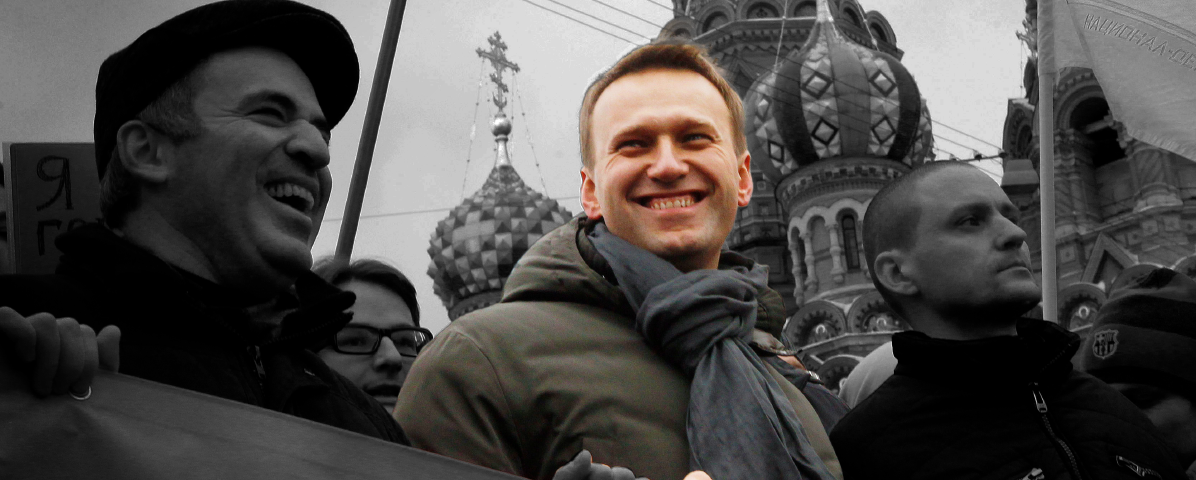A nation must think before it acts.
On February 16, Russian authorities announced that long-time opposition figure and Putin critic, Alexei Navalny, had died in prison while serving a nineteen-year-long sentence. Navalny, forty-seven, tirelessly challenged Putin’s corrupt, authoritarian regime, often at a high cost, and was no stranger to imprisonment and assassination attempts. In an infamous incident, in 2020, he suffered a near-deadly novichok poisoning, landing him in Germany for treatment. Navalny chose to return to Moscow once his health improved, knowing well that he would be arrested upon arrival on government-manufactured fraud charges. Navalny remained vocal from prison, spreading his anti-government message via social media as well as the work of his Anti-Corruption Foundation. Vehemently opposing Russia’s invasion of Ukraine, Navalny tirelessly urged Russians to fight the corrupt regime:
I believe the people who started this war are bandits and criminals. The fact that they are bombing people simply to continue stealing means that I’ve done everything right since 2011 — when I created Anti-Corruption Foundation to fight this criminal regime. Everything has a price, and now, in the spring of 2022, we must pay this price. There’s no one to do it for us. Let’s not ‘be against the war.’ Let’s fight against the war.
What does Navalny’s death mean for opposition voices in Russia? How will the voters react as they head to the polls on March 16–17 to participate in the upcoming presidential election? We offer you an FPRI expert commentary below:
Olga Khvostunova
Alexei Navalny’s death marks another low in Russia’s abysmal record of the state’s dealing with dissent. It also marks the death of a possibility for a better, more democratic future for the country—a possibility he so clearly represented. Navalny enters the pantheon of larger-than-life, brave, strong-minded Russian heroes who fought for what they believed in—freedom, prosperity, life without fear—until their dying breath. And in that sense, Navalny lives as a symbol of that fight, and it is much more difficult to destroy a symbol than destroy a man.
As much as this devastating news seems like a political gain for Vladimir Putin (as Joseph Stalin allegedly said “no man, no problem”) this would be a short-sighted view. Navalny’s work and his cause will live through his family, friends, supporters, and people he had influenced and will continue to influence. Once the shock wears off, the work he had started will resume, there can be no doubt about it. The results, however, might take longer to see. But there is one immediate effect of Navalny’s death for the US officials and policymakers to consider: It might be worth ramping up efforts to save other prisoners of the Putin regime, like journalist Evan Gershkovich or oppositionist Vladimir Kara-Murza. While there is still time.
Sara Ashbaugh
When Alexei Navalny returned to Russia in January 2021, he knew he would be imprisoned. Six months earlier, he had been airlifted from Siberia to Germany for medical treatment following a poisoning attempt on his life. Some people wondered if he would stay in Europe after his recovery, where he might be safer, but Navalny never considered it. “It was never a question ‘to return or not.’ Simply because I never left. I ended up in Germany, arriving in an intensive care unit, for one reason: they tried to kill me … But I’m not interested in what they’re doing. Russia is my country, Moscow is my city, and I miss them,” he wrote on Instagram. He was arrested almost immediately upon arriving at Moscow’s Sheremetyevo airport.
Navalny remained an influential opposition activist despite spending the past three years behind bars. His bravery in returning to Russia inspired countless others to voice their dissent against the increasingly repressive regime. He didn’t give in to the government’s obvious attempts to silence him, even after he was repeatedly sentenced for politically motivated charges. He symbolized hope for Russia’s democratic future, advocating for voters to support opposition candidates in Russia’s upcoming presidential election. His death is a blow to Russia’s opposition movement, which has lost a preeminent and charismatic leader.
András Tóth-Czifra
At the time of writing this, we’re still waiting for confirmation, from his team, of the news that Alexei Navalny was murdered. But even the fact that the authorities announced it, with such glibness, so close to the March presidential election, expecting no repercussions, is terrible news, especially for all other political prisoners, of which there are many, including his associates. It essentially means that no one is safe.
Navalny’s organization and his network of supporters have been systematically destroyed, jailed, forced into exile, and intimidated over the past three years, by political, legal, and security authorities in Russia. But this suggests that the Kremlin and/or the security services expect no consequences from his murder or deem the risks too low compared to the benefit of demonstrating their power. This sends a chilling message—one that should have been clear to all at the very least since 2020, the first attempt to murder Navalny. He is by far not the first Kremlin critic to be murdered. Navalny’s death should dispel all remaining doubts about the extreme danger Russia’s ruler represents, even to his own people.
Robert Hamilton
I have been studying Russia for twenty-eight years, and every time I think I can no longer be surprised by the Kremlin’s brutality and criminality, I eventually am. Alexei Navalny joins a long line of Russians who have died fighting for a more just Russia. Whether it’s the murder of political opponents, the genocidal war it is waging against Ukraine, or more casual criminality, like the kidnapping of two Georgian citizens today, Putin’s regime presents an acute, militarized, criminalized threat to everything Western governments claim to value.
The easiest way to reduce the threat the Kremlin presents is to destroy its warmaking capability by accelerating and expanding aid to Ukraine. US military aid to Ukraine since Russia’s full-scale invasion amounts to only 3.2 percent of the US defense budget over that period, and Ukraine has used that aid to devastating effect. The fact that Ukraine aid is now a partisan political issue in the US is national security negligence on a breathtaking scale. The West has the means to defeat the Russian threat, the question is whether it has the courage.
Phil Wasielewski
Navalny’s imprisonment and now reported death are instructive for the light it sheds on what the Kremlin most fears and abhors. For the past several years, Navalny faced the full brunt of the Kremlin’s wrath by being jailed for violating his parole from a spurious 2013 conviction because he left Russia for medical treatment after a state-sponsored nerve agent poisoning (somewhere in the afterlife Franz Kafka is probably kicking himself for not imagining such a surrealistic plot). The Kremlin’s long vendetta against Navalny was likely supercharged in this decade by two impulses: one personal and one structural.
The personal aspect was Navalny’s January 2021 documentary, Putin’s Palace, about President Vladimir Putin’s personal corruption including extensive views of his hidden Black Sea mansion. This broke a key Kremlin commandment that Putin was never to be humiliated. The structural aspect was Navalny’s “smart voting” initiative, which threatened to undermine the electoral façade of legitimacy for Putin’s regime. Smart voting encouraged Russian citizens to vote for any candidate capable of defeating a United Russia party candidate to deprive the Kremlin of a monopoly of legislative power. It proved successful in municipal council elections in 2019 and 2020 from Moscow and St. Petersburg to Tomsk and Novosibirsk.
In the zero-sum mindset of the Kremlin, this raised fears regarding the then-upcoming September 2021 Duma elections. A successful smart vote campaign in these elections could demonstrate not only Putin’s declining popular support but also revive the Bolotnaya Square movement that protested previous electoral fraud and manipulation, not just in Moscow this time, but on a national level. In the Kremlin’s eyes, a massive popular backlash following Duma elections could be a catalyst for the long-feared Color Revolution against the regime. Hence came the poisoning of Navalny in 2020, his arrest immediately upon his return to Moscow in January 2021, and the banning of the activities of his political/anti-corruption organization in April 2021. These were the actions of a ruling circle insecure in its hold on power and paranoid of any challenge to it no matter how limited or remote. It demonstrated, even before the war in Ukraine, a system that was weak and scared, vice strong and self-assured.
Navalny understood this systemic weakness but also knew the measures Putin’s regime was willing to take to stamp out any opposition. Still, he returned to Russia and was willing to gamble with his life (a gamble he lost) on the slightest possibility of change from below eventually turning into the consent of the governed. He knew that no leader could lead change in Russia from outside of it and that a prison cell in Siberia was more of a commitment to that possible change than a hotel suite in the West.
In closing, I believe the best epitaph for Navalny, a man not perfect but committed to the true soul of his nation, would be to repeat those words that Anna Akhmatova wrote to introduce her masterpiece poem “Requiem” about an earlier and similarly horrible time in Russia’s history.
Нет, и не под чуждым небосводом,
И не под защитой чуждых крыл, –
Я была тогда с моим народом,
Там, где мой народ, к несчастью был.
No, and not under a foreign firmament,
And not under the protection of a foreign wing, –
I was then with my nation,
There, where my nation unfortunately was.
Image: Opposition leaders Garry Kasparov (L), Alexei Navalny (C) and Sergei Udaltsov (R) hold a banner during an opposition protest in St.Petersburg February 25, 2012. REUTERS/Alexander Demianchuk



